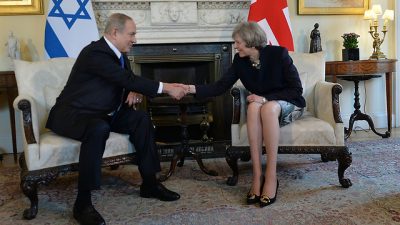Antisemitism in British Politics Is Dependent on UK Foreign Policy

If the May Government will order an immediate embargo on UK arms sales that are used to oppress and kill Palestinians; and if those pro-Israel British citizens will stop sending millions of pounds of tax-exempt charitable funds in a national scandal that helps bolster the Right-wing Likud party and its military occupation force; and if the CFI lobbyists will stop infiltrating the elected Government at Westminster, then the level of antisemitism would, no doubt, fall dramatically.
The linkage is clear. Both the British public and the majority of MPs of all parties, do not take kindly to those who either support or practice racial prejudice and ethnic cleansing, or who exploit British tax laws to support a foreign, expansionist, neo-colonial, nuclear regime that treats the UN Security Council with obvious contempt.
The solution is simple. Stop the indefensible supply of arms and money to the only undeclared nuclear weapon state in the world. A state that, virtually alone, refuses to be a party to the (OPCW) Organisation for Prohibition of Chemical Weapons to which virtually every other United Nations member is a party. There is a curious cognitive dissonance in supplying arms to a foreign and often brutal occupier of land and then subsequently expressing surprise at the resultant antipathy towards those who are perceived as supporting that destructive policy.
The UK has to choose between political and moral integrity, and increasing antisemitism. It’s a choice that, to date, Mrs May has made badly and the very serious consequences of that choice could determine not only the level of antisemitism but also whether the future will be one of peace, or war. The British government must adopt an ethical foreign policy in order to avoid the backlash of outraged public opinion.
The propping-up of an illegitimate occupation force of illegal settlers in the Middle East – (which has already been condemned by the UN Security Council) – with its 10 year old blockade of essential goods to a civilian population of nearly 2m people, is a very dangerous foreign policy that has consequences – some of which we see now in Britain, Europe, the US and around the world.
*
Hans Stehling (pen name) is an analyst from the UK. He is a frequent contributor to Global Research.

